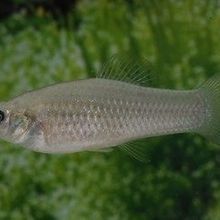Login
Subscribe404
Not Found
Is this what you were looking for?
tag asexual reproduction evolution genetics genomics

Amazonian Fish Genome Challenges Long-Held Assumptions About Asexual Reproduction
Jim Daley | Feb 14, 2018 | 2 min read
Poecilia formosa, an all-female fish species, has a surprisingly robust genome.

Yeast Made to Harvest Light Hint at Evolution’s Past
Kamal Nahas, PhD | Feb 21, 2024 | 6 min read
Scientists transferred light-harvesting proteins into yeast for the first time, shining a light on the past lives of eukaryotic cells.
Genetic benefits of asexuality?
Kerry Grens | Oct 10, 2007 | 3 min read
Functional divergence of former alleles may explain an asexual organism's evolutionary success

Male Fish Borrows Egg to Clone Itself
Ruth Williams | May 23, 2017 | 3 min read
A fish created by spontaneous androgenesis is the first known vertebrate to arise naturally by this asexual reproductive phenomenon.

How Hydras Regenerate Decapitated Heads
Dan Robitzski | Dec 14, 2021 | 5 min read
Hydra vulgaris constantly replenish the cells in their heads and grow new ones to reproduce asexually. But gene expression analyses reveal that regenerating a head after an injury is a very different process.

How a Grasshopper Gave Up Sex, Took Up Cloning
Dan Robitzski | Nov 1, 2022 | 5 min read
Meet the grasshopper that has reproduced asexually for a quarter of a million years—without acquiring undue numbers of harmful mutations.

Corals Upend Longstanding Idea About Genetic Inheritance
Natalia Mesa, PhD | Sep 1, 2022 | 4 min read
Most animals can’t pass on mutations that arise spontaneously throughout their lives—but Elkhorn corals can.

Could Dad’s Mitochondrial DNA Benefit Hybrids?
Alejandra Manjarrez, PhD | Jan 20, 2022 | 7 min read
Studies have found that organisms can inherit mitochondria from male parents in rare instances, and both theoretical and experimental work hint that this biparental inheritance is more than just a fluke.

Mice Pass Epigenetic Tweaks to Pups
Katherine Irving | Feb 17, 2023 | 5 min read
An engineered methylation pattern persisted for four generations of mice, demonstrating transgenerational epigenetic inheritance can occur in mammals.

Genome Spotlight: C-fern (Ceratopteris richardii)
Christie Wilcox, PhD | Sep 22, 2022 | 5 min read
Sequences for the model organism and two of its kin reveal how these plants got their oversized genomes.